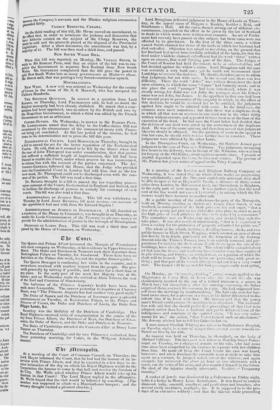Lord Brougham delivered judgment in the House of Lords on
Thurs- day, in the appeal cases of lloggan v. Rankin, Kedder v. Reid, and Strathmore v. Hall. All the cases, though arising out of different cir- cumstances, depended on the effect to be given by the law of Scotland to deeds in which words were written over erasures. An act of Parlia- ment had recently been passed on this subject, but these cases were not affected by its provisions, la the first of' the three cases, a widow named Smith claimed her tic cc of the lands of which hoer husband had died enfeoffed. Objection wits raised to her claim, on the ground that her husband load never been lawfully enfeofred of the lands, for that due deed under which he claimed enfeolfinent had the word " three" written upon an erasure, that word limning part of' the date. The Judges of Cite Court of Session had held tho erasure to be ;re ,A.5imiliodibus, and load decided against the widow's claim. bird Brougham said the case was certainly a very hard one ; et he could loot recommend their Lordships to reverse the decision. I fe should, thereforeonove to affirm that judgment, but not with costs. In the sectmd case there NraS less difficulty. There the word "John " was written throughout the deed. upon erasures, isi which thc name "James" bad formerly stood; and in one place the word " younger " had been introduced, where it was clearly wrong, for John was not John the younger, since his father's name was not John, but James. As the appellaut in that case had been for several years in possession of' the property to which, by the effect of this decision, he would lw declared not to be entitled, doe judgment against him ought to be affirmed with costs, lu the third case, the erasures were most numerous ; but then there was a duplicate deed, in which all that was on erasures in one deed was in the other fairly written without erasure, and appeared to have been so at the time of the execution of the deed. In that ease the Court below bed decided that the defects of one deed were cured by the correctness of the duplicate deed. He was of the same opinit es and therefore moved that judgment likewise should be affirmed. On the question of costs in the appeal in this last case, he should wish to tehe further thee to consider. These judgments were affirmed by the other Lords.
In the Prerogative Court, on Wednesday, Sir I lerbert ienuer gave judgment in the case of Pittston v. Williams. Tee judgment, occupying
five hours ill the delivery, no non in flivour of Mr. Williams. Who was tried for forgery at the Old Bailey, ;Oven eiehteen months suttee. I:pwards of 50,0001. depended upon the issue, to sides real estates. 'Ishe picador of Mr. Penton has given notice of appeal Co the Privy Council.


























 Previous page
Previous page